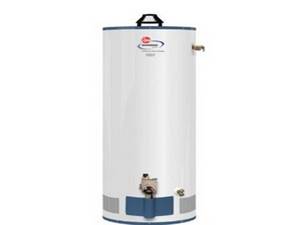Sulfur smell likely comes from water heater, is fixable
Dear Keith,
Our house has a well and we have a bad sulfur smell only when the hot water is on. My hot water heater is only three years old. I have flushed the water tank and a couple weeks later the smell comes back. Any suggestions?
—Cindy T., Ann Arbor
This can be very frustrating and the odor, similar to a rotten egg, can be offensive. The good news is there are a couple things that you can do to help minimize this effect, with certain precautions.
The smell can originate from hydrogen sulfide gas in softened water and can be from a number of sources. However, due to the smell being from the hot water, it is likely in your hot water heater. The sulfur smell in hot water heaters typically originates because of two reasons:
1. The warm environment creates a perfect environment for sulfur bacteria.

Photo from Amazon.com
2. A reaction between the parts in the hot water heaters known as an anode rod and the sulfate in the water. The anode rod attracts the corrosive agents in the water heater to deteriorate itself, instead of the water heater.
You may want to first remove and replace the anode rod to see if that alleviates the problem. Typically it can be removed by turning off the water, releasing the pressure, unscrewing the plug and replacing the old part with the manufacturer's recommended new part. Your owner's manual usually has directions for replacing the anode rod. Many homes with a water softener have replaced the anode rod with an electric powered anode rod to solve the problem.
According to the Minnesota Rural Water Association, you can also temporarily turn your water heater on “High” for several hours. This will normally heat the water to 140 degrees or higher and will kill most bacteria. Use extreme caution, as this can produce scalding water which can cause major injuries. Before proceeding, be sure to consult with the manufacturer or dealer regarding an operable pressure relief valve. Afterward, turn the water heater temperature back to normal and drain the water through a faucet.
Flushing the water heater with two to three pints of hydrogen peroxide (safer than bleach) will also disinfect. When completed correctly, this process can also kill most bacteria. Keep in mind this will temporarily remove the odor until the water heater sits for a long period of time, then the odor will return.
Lastly, occasionally bacteria can build up in the basin overflow. Pouring some hydrogen peroxide may help dissipate the odor.
Paul is a State of Michigan Licensed Builder. Paul serves as president and founding member of nationally franchised HandyPro Handyman Service, servicing Washtenaw, Wayne and Oakland Counties; visit www.handypro.com. Listen to Paul every Saturday at 11 a.m. on “It’s Your Home, Let’s Talk About It” on WAAM Talk 1600-AM. E-mail questions or comments to kpaul@handypro.com.


Comments
Keith A. Paul
Sun, Oct 24, 2010 : 6:23 p.m.
I have heard removing the anode rod with a plug has been successful at ridding the odor smell. However, keep in mind it voids the warranty and not recommended by experts author Larry and Suzanne Weingarten, "Water Heater Workbook", because your tank will corrode faster. Although, I do know a family who has removed the anode rod completely with a 13 year old water heater.. with no more smell. I havent found any information that will support replacing with a tankless water heater will help. The Wiengartens, state that the electric power anode rode may not fix the issue either.
David Briegel
Fri, Oct 22, 2010 : 4:05 p.m.
81wolverine, you may call me if you wish. I can help.
81wolverine
Fri, Oct 22, 2010 : 3:01 p.m.
We've had this problem for a long time. The carbon filter we installed on our water softening system temporarily alleviates the problem. But, after a few weeks, the smell is back. We have a well instead of city water, and our well contractor gave us some elaborate procedure for chlorinating our well, maybe figuring get rid of the bacteria at the source. Both this and turning up the temp on the water heater only sound like temporary solutions. I'm curious, is the electric powered anode a permanent solution? Also, what about installing one of those tankless water heaters? Theoretically, that would eliminate most of the issue of warm water sitting in a tank where the bacteria can form easily. I'd be interested to hear answers to these questions.
David Briegel
Fri, Oct 22, 2010 : 1:06 p.m.
Replace the water heater anode rod with a plug. The replacement rod just adds a different odor. Reverse osmosis removes flouride. Dentists do recommend flouride for children.
Chooch
Fri, Oct 22, 2010 : 9:44 a.m.
Now if we could only get that pesky fluoride out of our water...